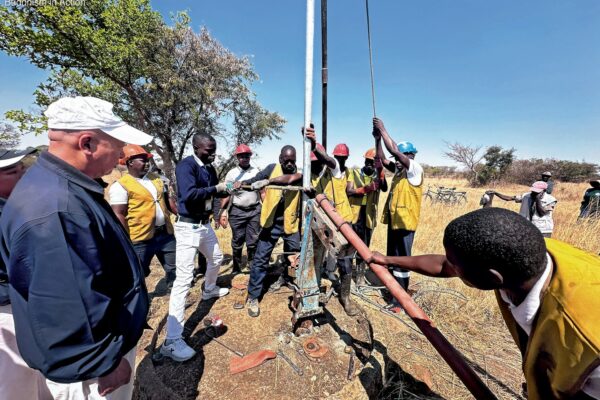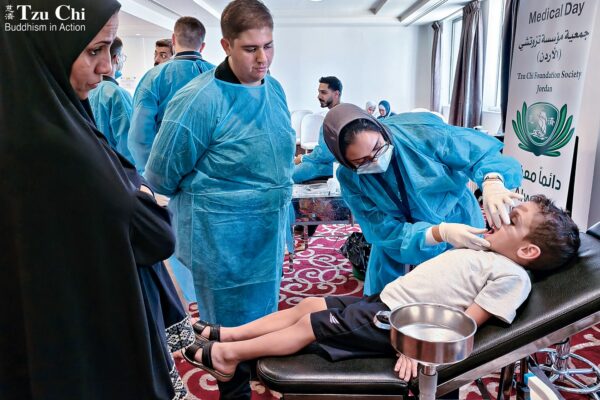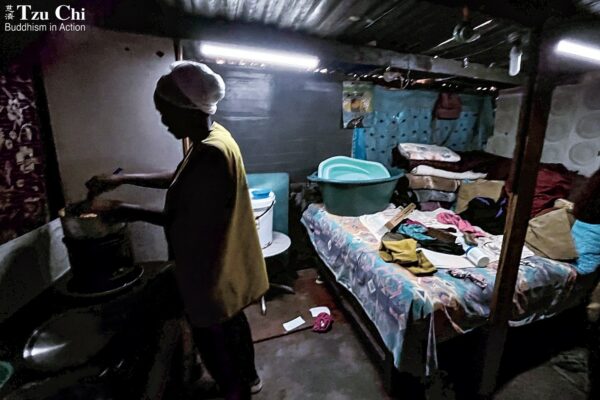Text and photos by Karmen Long, Tzu Chi International Medical Association
Translated by Wu Hsiao-ting
Tzu Chi volunteers in Mozambique bravely visited communities at risk of COVID-19 to ensure residents had essential information on how to avoid the disease. They were driven, despite the risk to themselves, by a sense of responsibility to take care of their communities.
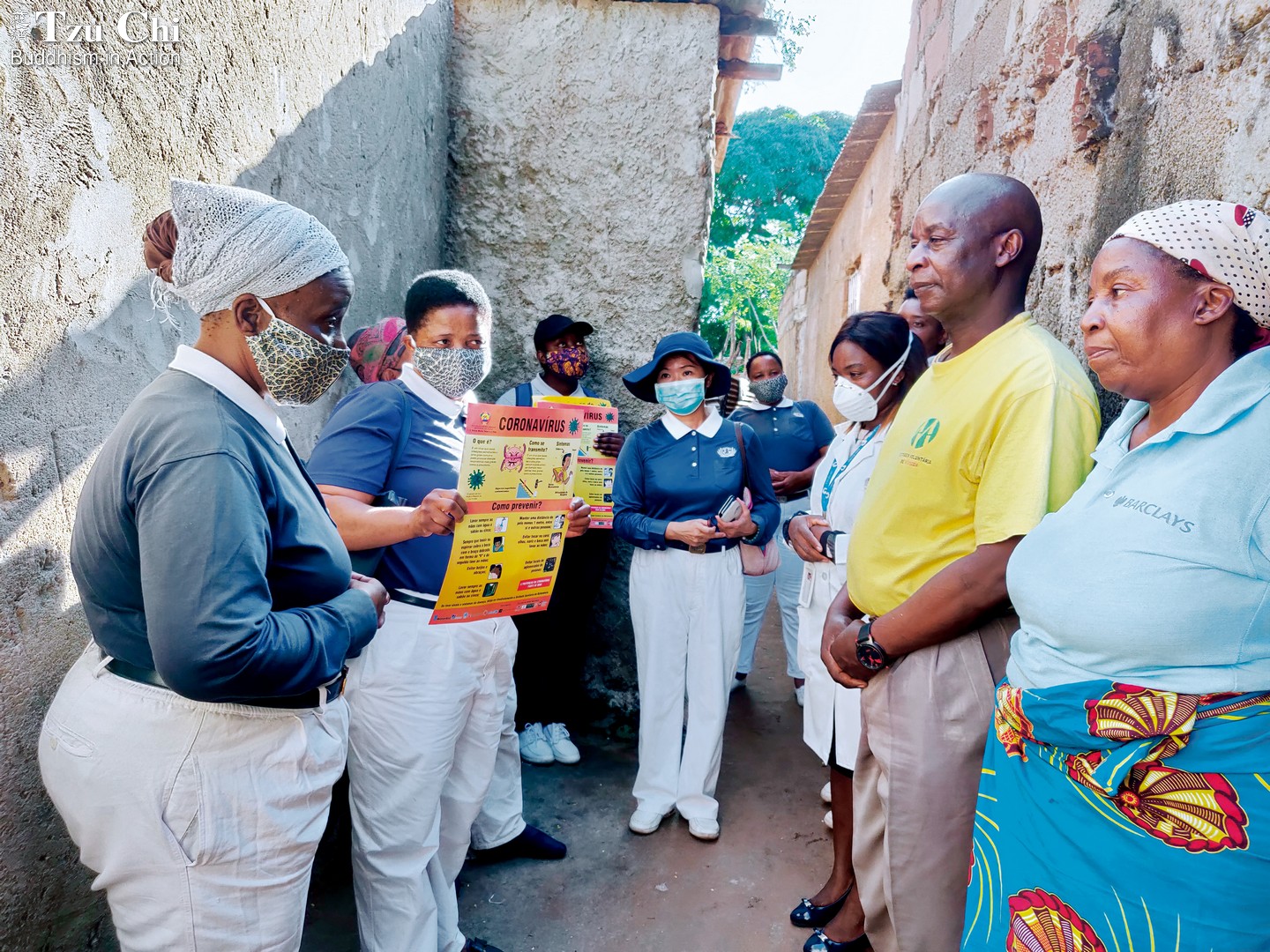
Invited by Mozambique’s health department, Tzu Chi volunteers visit communities to spread health information about the coronavirus. They shared verbally, using posters and written material, and even through theatrical performances.
In March 2019, Cyclone Idai hit Mozambique in Africa, dealing the country a hard blow. Barely a year later, just as the country was gradually recovering from the devastation and when students were able to return to their schools, the coronavirus pandemic took the world by surprise. Mozambique, like most countries around the world, has not been spared from the impact of this disease.
On March 20, 2020, seeing the number of confirmed cases rising rapidly in South Africa, President Filipe Nyusi of Mozambique introduced a series of preventive measures to protect his country from the coronavirus pandemic, even though there were no confirmed cases yet. Ten days later, on April 1, he declared a national state of emergency to last for 30 days.
The measures implemented in Mozambique to prevent the spread of the new coronavirus included limitations on entry to the country, and on movements within the country. Only cases of State interest, the transportation of goods by accredited operators, and health-related situations were exempted. Additional measures included a ban on public and private gatherings, and a mandated 14-day self-quarantine for all arrivals to Mozambique and all persons who had had direct contact with confirmed cases of COVID-19.
Even with the precautions, the country recorded its first coronavirus case on March 22. The number of diagnosed infections slowly crept up to more than a hundred by mid-May, though the rate of growth may have been obscured due to the limited testing capacity in the country.
Safeguarding medical professionals
Mozambique is one of the world’s poorest countries, ranking seventh from the bottom worldwide in terms of GDP per capita in 2019. It was ill-equipped to handle a widespread outbreak of COVID-19.
The severe lack of medical equipment in the country is well known. The country has a population of 29 million, but only 34 ventilators nationwide. Beira Central Hospital in Sofala Province, central Mozambique, is the second largest hospital in the nation. Yet Dr. Bonifácio Cebola, the hospital’s deputy superintendent, told me and other Tzu Chi volunteers in March that the hospital had only two ventilators to serve patients from among nine million people in four central provinces. As if that fact wasn’t crushing enough, the two machines had been broken for some time. Faced with the threat of the coronavirus, Dr. Cebola and his colleagues were really worried.
Mozambique isn’t just short of medical equipment, but actual medical workers too. The few doctors and nurses in the country couldn’t afford to be sidelined by the coronavirus. That would have made a bad situation worse. Sadly, the personal protective equipment (PPE) that would have protected the doctors and nurses from falling ill as they served patients was as limited as everything else.
As of mid-March, Beira Central Hospital had less than a hundred medical masks left. Other hospitals were doing no better. Doctors at Nhamatanda Rural Hospital, also in Sofala Province, had none. Though they had turned to Beira Central Hospital for help, the central hospital was powerless to do anything—when Beira Central didn’t even have enough masks to meet their own demand, they were in no position to supply another hospital.
I’m a physician myself, and when I learned that my fellow doctors had to examine and treat patients unprotected, without even the most basic PPE, my heart really went out to them. When Tzu Chi volunteers in the nation heard the news of this situation, Tzu Chi Mozambique donated medical masks to 12 hospitals and two testing centers so that the medical workers there could have better protection.
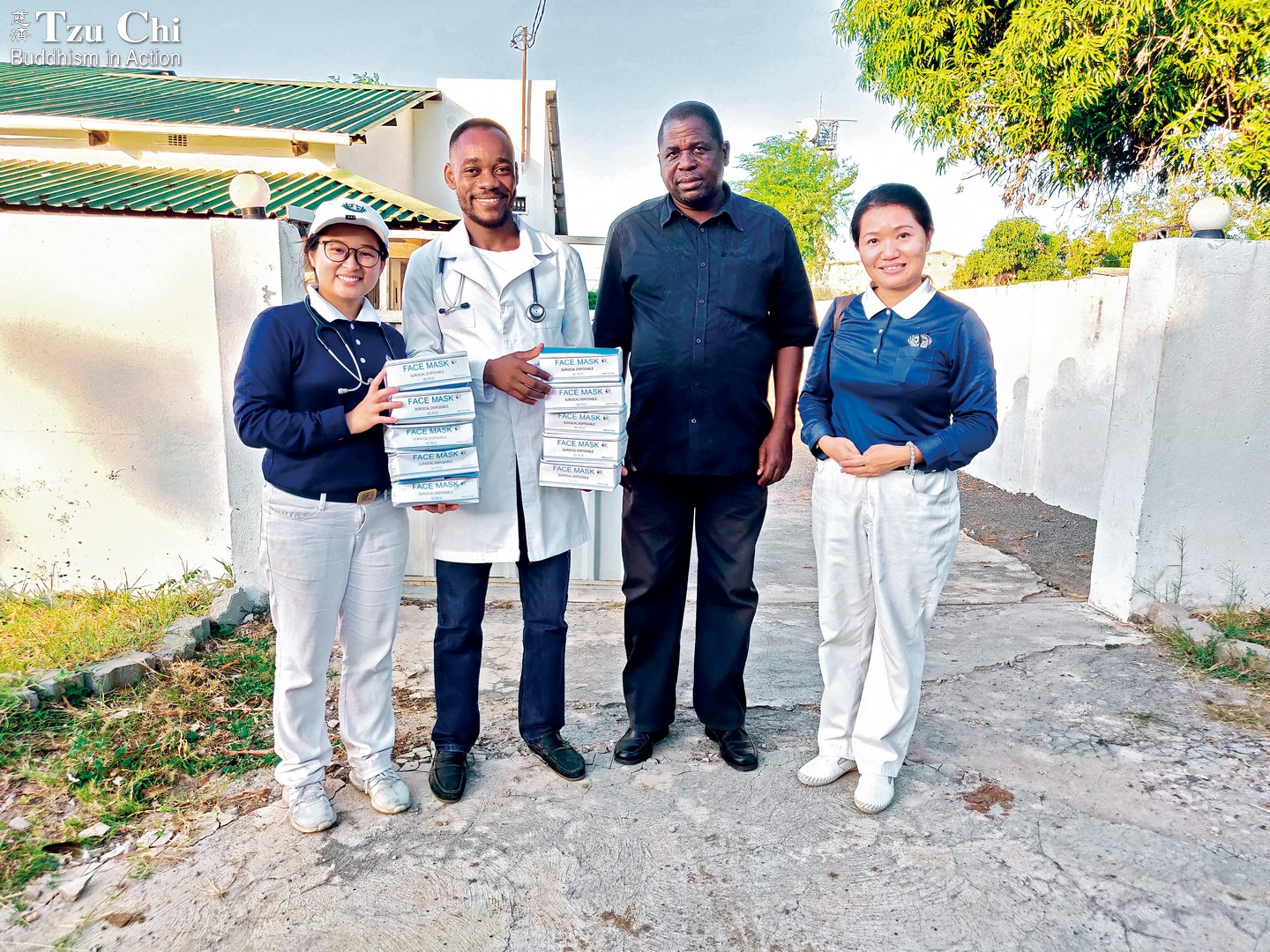
Dr. Karmen Long (龍嘉文, first from left), the author of this article, and Denise Tsai (蔡岱霖) donate medical masks to Nhamatanda Rural Hospital to help medical professionals there better protect themselves during the coronavirus pandemic. DANIEL TOME
Instead of soap
In this digital era, almost everyone has a smartphone. With just a light touch or a swipe on our screens, we can bring up news from around the world. But this is not the case in Mozambique. Many households here don’t even have running water or electricity, let alone a television, radio, or cell phone. Those latter technologies are luxuries most locals can’t afford. Thus, as the coronavirus began to spread around the world, the Mozambican government was concerned that many of its citizens, especially older people, were putting themselves at risk of an infection because they had no way of learning about the pandemic and how to protect themselves.
As there are Tzu Chi volunteers in every community in Maputo, the capital of Mozambique, the government’s health department invited Tzu Chi volunteers to help spread information about preventing COVID-19 to community residents. To that end, the government sent medical professionals to the “Tzu Chi Home,” a Tzu Chi facility in Mahotas, Maputo, to provide training to volunteers.
After the training, volunteers began visiting community after community to share with people how to protect themselves from the novel coronavirus. They took with them buckets, soap, masks, and posters printed with coronavirus-related health information. During their visits, they met many people who had never even heard of COVID-19.
Our world witnessed a shortage of hand sanitizer and disinfectant alcohol after the outbreak of the pandemic. People everywhere scrambled to buy what they could. But in Mozambique, an ordinary citizen had to think twice even about the purchase of soap and cloth masks. In the face of the coronavirus pandemic, how could the purchase of even these simple items be a cause of concern?
The answer to that question is simply a matter of economics. People who have a steady job in Mozambique make an average of less than 5,000 metical (US$70) a month. But most local people have no regular jobs; they make a living by doing odd jobs, and thus have no regular income. For example, the monthly income of the native Tzu Chi volunteers in Maputo ranges from 1,000 to 2,000 metical.
A bar of soap costs 20 Mozambican metical (30 U.S. cents) in Mozambique, but before the pandemic drove up food prices, that same amount could purchase eight tomatoes. With incomes being what they are for the locals, it is a no-brainer for them whether they should spend 20 metical on tomatoes or soap. Purchasing food will win out every time.
The world of the impoverished is beyond my imagination. Without masks, how do they protect themselves from COVID-19? Without soap, how do they wash their hands to reduce the chance of picking up the virus? To my surprise, I learned later that people in the countryside areas of Mozambique use ashes from cooking fires to clean their hands. When I learned about this from a promotional video made by the government’s health department, I asked local volunteers about it and was told that using wood ashes as a cleaning agent was actually very common for them.
Later, when I went online to check this out, I discovered that people in many poor countries have been taught to use wood ashes to clean their hands too. Even the World Health Organization has made such a suggestion. Wood ashes are alkaline, so when no soap is available, they mix some ashes and a little water into a paste to create a home-made cleaning agent.
When a volunteer shared this with Master Cheng Yen in Taiwan in a video conference, the Master said that people in Taiwan used to use that same strategy in the old days, when resources were scarce, and people were generally poor. Only then did I realize how blessed people of our generation are.
The Master often says that we are taught to count our blessings when we see the suffering of others. That’s indeed true. Hailing from Malaysia and now practicing medicine in Mozambique, I’ve learned from my everyday life here to appreciate even more the comfort and convenience of life I enjoy. With what we are blessed to have, shouldn’t we spend more of our time serving the needy instead of focusing all our attention on pursuing personal gain?
The community needs me
Denise Tsai (蔡岱霖), who is from Taiwan, was the first Tzu Chi volunteer in Mozambique. The first community she visited when she first started doing charity work in Mozambique back in 2012 was Maxaquene. It was also where volunteers kicked off their anti-coronavirus campaign.
Rebeca Mabunda, 58, is a Tzu Chi volunteer who lives in Maxaquene. She was among the first group of volunteers who helped Denise Tsai carry out Tzu Chi work in Mozambique. Other volunteers and I followed Rebeca into Maxaquene and saw how she talked with confidence about the novel coronavirus to community residents, and how proficiently she showed them the proper way of washing their hands. Seeing her like this, I found it hard to imagine that just eight years before, she had been a mother suffering from domestic violence. Denise told me that Rebeca had once been abused so badly by her husband that her face was covered in blood. Denise quickly rushed over to help her after being alerted of the incident by another care recipient.
Denise worked with the couple for six months before Rebeca’s husband gradually changed, during which time Rebeca also was transformed from a care recipient into a volunteer. Her work of giving to the needy eventually won her respect from her husband, who not only stopped abusing her but became proud of her for her role as a Tzu Chi volunteer.
Entering a community to spread word about the coronavirus was not without risks for Denise, Rebeca, and all the volunteers.
When South Africa implemented its lockdown in March, all the migrant workers in the nation were asked to go back to their home countries. As a result, tens of thousands of Mozambicans returned to their home country from South Africa in early April. The Mozambican government required the returnees to undergo home quarantine to reduce the chance that the virus would be brought into Mozambique, but these people still posed a threat to local communities.
Volunteers who visited communities for the anti-coronavirus campaign told me that they were worried about their safety when they first learned about the campaign. In the face of this disease, it’s human nature to be afraid. I was afraid too when I followed the volunteers to communities where infections had been detected.
But they didn’t let that fear stop them. Rebeca said that she believed that if they took the necessary precautions, they didn’t need to be overly worried. They also embraced a sense of mission for their work. That sense of duty and mission helped them overcome their fear and motivated them to do better and better at educating their fellow Mozambicans about the disease. They faced their fears with courage and visited community after community with their important message.
The spirit of our volunteers helped keep me going too. I was greatly moved when I heard them say that as Tzu Chi volunteers, they believed they had a duty to take care of local communities. I witnessed the bodhisattva spirit in this group of mothers and grandmothers. Instead of seeking comfort for themselves, they chose to reach out to help others. They are truly worthy of my deepest admiration.
Tzu Chi volunteers distribute face masks to people in a vehicle. The Mozambican government made it compulsory on April 8 for everyone to wear a face mask on all forms of passenger transport. A shortage of masks on the market made it difficult to carry out, so people were very happy to receive masks from Tzu Chi volunteers.
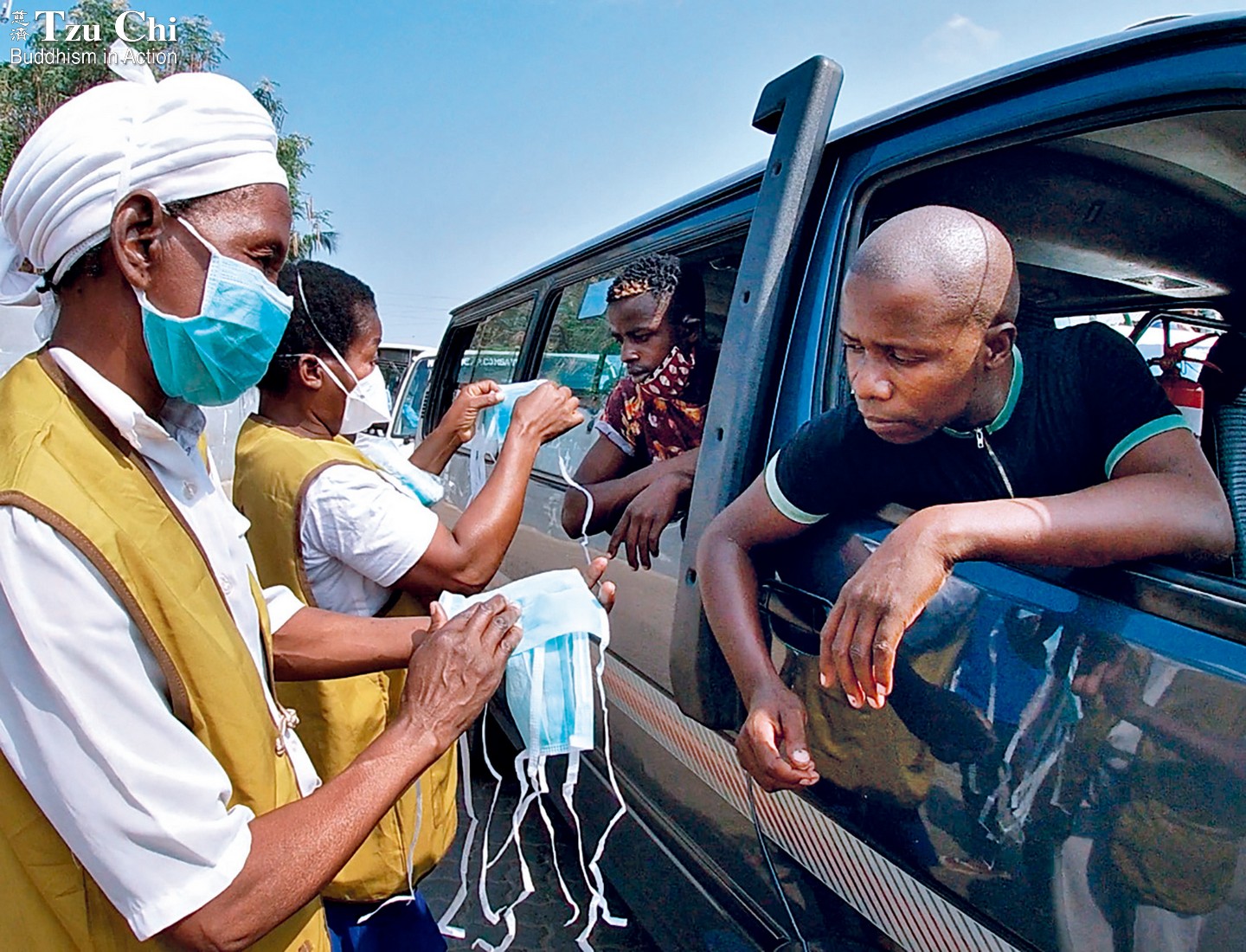
Unemployed
A virus does not choose its host based on skin color, status, or other physical or social distinctions. The coronavirus preys upon the rich and poor, young and old, with no regard for race or ethnicity. However, when it comes to the lockdown measures that countries around the world have implemented to contain the pandemic, the poor suffer the greatest impact.
Originally scheduled to end on April 30, Mozambique’s state of emergency was extended twice more, for a total of 60 more days. Though the decision was made to keep the country’s citizens safer, it has made life very difficult for those at the bottom echelon of society.
When Mozambique declared its state of emergency, even roadside stalls were forced to close to prevent the gathering of crowds. Many Mozambicans scrape together a living by running stalls like this. With that income gone, what could they do? Similarly, some local women worked as house maids for richer families. Most of them had to take a bus to work, which exposed them to a higher risk of contracting the virus. As a result, their employers chose to temporarily lay them off during the pandemic. At the beginning of the state of emergency, the first things in stores that were sold out were, surprisingly, washing machines. Wealthier people can get along without a house maid, but what about poorer people who have been let go?
The economic impact of being thrown out of work was made worse by rising food prices during the pandemic. Mozambique imports more than 70 percent of its food from South Africa. When South Africa reduced its food exports as a result of its own lockdown measures, it resulted in a spike in food prices in Mozambique. That just rubbed salt into the economic wounds of the working poor.
Some native volunteers told me that they used to be able to buy a week’s worth of food for their entire family with 1,000 metical (US$14.20), but that was no longer the case. For example, the price of a bag of onions has risen from 250 to 700 metical. Volunteer Elina Esmael Matavele told me that with food so expensive now, she has had no choice but to cut the amount of rice she cooks for her family of seven by half. Some volunteers started to add tapioca to their rice to keep their families fed. If their children still complained that they were hungry, they told them to drink some water and go to sleep to stave off the hunger pangs.
Realizing the livelihood problems faced by many families, Tzu Chi has decided to implement food relief projects in the country to help those affected by the pandemic.
Less meat to relieve food shortages
A food supply problem has long existed in our world. The coronavirus pandemic has made this problem even worse.
Actually, our global food production has been on the rise year after year. With that, there should be enough food to feed everyone on the planet. However, that’s not the case. In 2019, more than 800 million people in the world didn’t have enough food to eat. According to an Environmental Research Letters study, a contributing factor is that 36 percent of the calories currently produced by the world’s crops are being used for animal feed. Only 12 percent of those feed calories ultimately contribute to the human diet.
I began dreaming of practicing medicine in Africa more than ten years ago. Later, when I joined Tzu Chi, my understanding of the world increased, and I began to realize that I was actually contributing to the world’s hunger problem by eating meat. I was eating for a single meal what should have been enough to last a person in Africa for several days. That realization made me understand that if I wanted to help people in Africa, I didn’t even have to go to the continent—I could just become a vegetarian.
Ten years have passed since then, and I did end up being a doctor in Africa. From the time I’ve spent here, I’ve learned how much children here pine for food. I’m happy I became a vegetarian ten years ago. But me being a vegetarian is not enough. We need more people, a lot more people, to become vegetarian if we really want to make a difference. Given that the duration of gastronomic satisfaction is very short, is it worth it to make the world’s food problem worse just to satisfy our palates for a few seconds?
I shared with a gathering of local volunteers the importance of eating vegetarian. They were stunned when they learned that the number of animals eaten by humans per day was six times the population of Mozambique. Many expressed their willingness to try a vegetarian diet afterwards. The next day, Antonio Patricio, a young volunteer, shared a photo of his dinner with me. I was surprised to see that his dinner consisted only of rice and cucumbers.
Antonio is an orphan with no income or land to grow crops. To feed himself, he often turned to rivers to find food. He’d just eat whatever he caught. As such, becoming vegetarian was quite a challenge for him—even more so because vegetables often cost more than meat in remote countryside areas. I was concerned that he would not have enough to feed himself if he became a vegetarian, but he assured me he would be okay. He said what Master Cheng Yen said about how we shouldn’t hurt animals to feed ourselves resonated with him. He said he was happy even if he had only cucumbers and rice because he felt at peace being a vegetarian. He even pledged that he’d eat vegetarian for the rest of his life.
Antonio has difficulty keeping himself fed every day, but even so, when he learned that so many animals were being slaughtered for human consumption, his heart went out to those animals so much that he decided right then to adopt a vegetarian diet. Compared with him, we are blessed with far more resources. Shouldn’t we make a bigger effort to help starving people by eating vegetarian?
It isn’t easy for our volunteers in Mozambique to get by. Yet despite their poverty, they took up charity work to help their own people after hearing Master Cheng Yen’s teachings. Motivated by a sense of mission, they were willing to conquer their fear and visit communities to spread word about the coronavirus. They are even willing to eat vegetarian to help protect life. They are truly the living embodiment of loving-kindness and compassion.
We may not know the course the pandemic will take, but one thing is certain: our volunteers in Mozambique will continue to follow the Master’s teachings by doing what they can to accompany people in their own communities through this difficult time. They will stay true to their commitment to serving the needy.
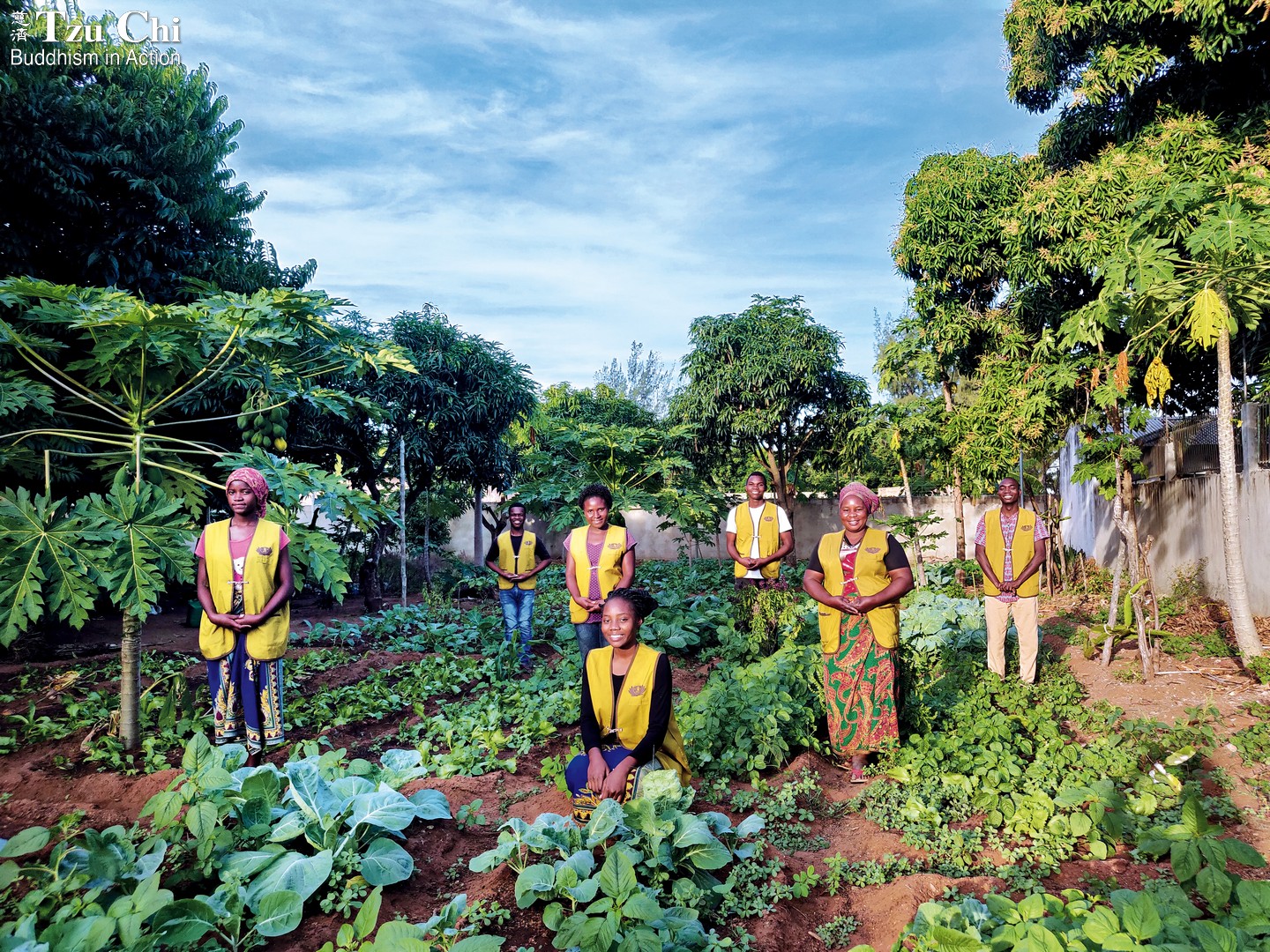
Mozambican volunteers stand amidst flourishing vegetable gardens at the Tzu Chi Home in Maputo. Mozambique imports more than 70 percent of its food from South Africa, but South Africa cut down on its food exports during its own lockdown. In response, volunteers expanded the land where they grew vegetables at the Tzu Chi Home as a preparatory measure to meet food shortages.

